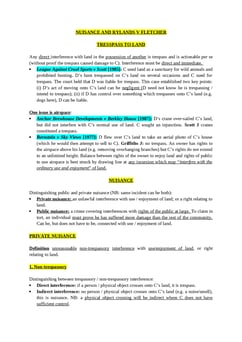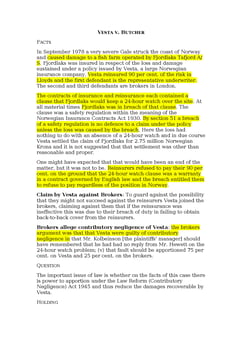Parsons v Uttley Ingham [1978] QB 791
Judgement for the case Parsons v Uttley Ingham
Defendant was contracted to give Plaintiff a container for storing pig-feed, but they failed to put ventilation in it. As a result the food stored in it turned mouldy and when given to the pigs it caused them E-Coli.
Many pigs died and Plaintiff sued Defendant for lost profits.
CA allowed P’s claim.
Denning MR (minority approach to same conclusion)
-
There is a distinction between “loss of profit” cases and “physical damage” (whether to person or property) cases.
In loss of profit cases the test is whether Defendant ought reasonably to have contemplated, at the time of the contract, consequences which were a “real possibility” or a “serious danger”.
In physical damage cases Defendant is liable for consequences which, at the time of the contract, he ought reasonably to have foreseen, even if the possibility of their occurring was only slight.
He draws this distinction because this is used in tort and he says that the test for remoteness should be the same (otherwise the amount recoverable in a situation where there is a contract with no exemption clauses, where damage is inflicted, would differ depending on the legal classification: unfair).
This was a case of physical damage and the foresight requirement was satisfied.
Scarman LJ (majority)
There is no authority for the distinction between economic harm and physical harm.
To be recoverable, harm done to Plaintiff may reasonably be supposed to have been in contemplation as a serious possibility (Hadley).
There is no real difference between “reasonably foresee” and “reasonably contemplate” tests in contract and tort. The difference is in the probability (which is what Denning objects to and hence makes his distinction so as to reconcile contract and tort).
In asking what it was reasonable for Defendant to have contemplated we are imputing to him foresight which may be contrary to fact. Nevertheless we do it to maintain the “reasonableness” requirement.
RELATED CASES
For Further Study on Parsons v Uttley Ingham

Tort Law notes fully updated for recent exams at Oxford and Cambridge. ...
Need instant answers? Our AI exam tutor is here to help.
Ask questions 🙋 Get answers 📔 It's simple 👁️👄👁️
Our AI is educated by the highest scoring students across all subjects and schools. Join hundreds of your peers today.
Get StartedSimilar Cases
Related Product Samples
These product samples contain the same concepts we cover in this case.
| Commercial Remedies BCL | H Parsons V. Uttley Ingham Notes (4 pages) |
| Tort Law | Negligence Law Notes (20 pages) |


 Since 2010, Oxbridge Notes has been a trusted education marketplace, supplying high-quality materials from top achievers at universities like Oxford, Cambridge, LSE, Harvard, and Yale.
Since 2010, Oxbridge Notes has been a trusted education marketplace, supplying high-quality materials from top achievers at universities like Oxford, Cambridge, LSE, Harvard, and Yale.